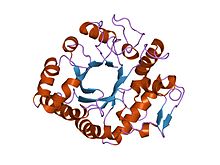| Glycoside hydrolase, family 17 | |||||||||
|---|---|---|---|---|---|---|---|---|---|
 crystal structure at 1.45- resolution of the major allergen endo-beta-1,3-glucanase of banana as a molecular basis for the latex-fruit syndrome | |||||||||
| Identifiers | |||||||||
| Symbol | Glyco_hydro_17 | ||||||||
| Pfam | PF00332 | ||||||||
| Pfam clan | CL0058 | ||||||||
| InterPro | IPR000490 | ||||||||
| PROSITE | PDOC00507 | ||||||||
| SCOP2 | 1ghs / SCOPe / SUPFAM | ||||||||
| CAZy | GH17 | ||||||||
| |||||||||
In molecular biology, Glycoside hydrolase family 17 is a family of glycoside hydrolases. It folds into a TIM barrel.
Glycoside hydrolases EC 3.2.1. are a widespread group of enzymes that hydrolyse the glycosidic bond between two or more carbohydrates, or between a carbohydrate and a non-carbohydrate moiety. A classification system for glycoside hydrolases, based on sequence similarity, has led to the definition of >100 different families. [1] [2] [3] This classification is available on the CAZy web site, [4] [5] and also discussed at CAZypedia, an online encyclopedia of carbohydrate active enzymes. [6] [7] y[ _]9 Glycoside hydrolase family 17 CAZY GH_17 comprises enzymes with several known activities; endo-1,3-beta-glucosidase ( EC 3.2.1.39); lichenase ( EC 3.2.1.73); exo-1,3-glucanase ( EC 3.2.1.58). Currently these enzymes have only been found in plants and in fungi.
References
- ^ Henrissat B, Callebaut I, Fabrega S, Lehn P, Mornon JP, Davies G (July 1995). "Conserved catalytic machinery and the prediction of a common fold for several families of glycosyl hydrolases". Proceedings of the National Academy of Sciences of the United States of America. 92 (15): 7090–4. Bibcode: 1995PNAS...92.7090H. doi: 10.1073/pnas.92.15.7090. PMC 41477. PMID 7624375.
- ^ Davies G, Henrissat B (September 1995). "Structures and mechanisms of glycosyl hydrolases". Structure. 3 (9): 853–9. doi: 10.1016/S0969-2126(01)00220-9. PMID 8535779.
- ^ Henrissat B, Bairoch A (June 1996). "Updating the sequence-based classification of glycosyl hydrolases". The Biochemical Journal. 316 ( Pt 2) (Pt 2): 695–6. doi: 10.1042/bj3160695. PMC 1217404. PMID 8687420.
- ^ "Home". CAZy.org. Retrieved 2018-03-06.
- ^ Lombard V, Golaconda Ramulu H, Drula E, Coutinho PM, Henrissat B (January 2014). "The carbohydrate-active enzymes database (CAZy) in 2013". Nucleic Acids Research. 42 (Database issue): D490-5. doi: 10.1093/nar/gkt1178. PMC 3965031. PMID 24270786.
- ^ "Glycoside Hydrolase Family 17". CAZypedia.org. Retrieved 2018-03-06.
- ^ CAZypedia Consortium (December 2018). "Ten years of CAZypedia: a living encyclopedia of carbohydrate-active enzymes" (PDF). Glycobiology. 28 (1): 3–8. doi: 10.1093/glycob/cwx089. hdl: 21.11116/0000-0003-B7EB-6. PMID 29040563.
| Glycoside hydrolase, family 17 | |||||||||
|---|---|---|---|---|---|---|---|---|---|
 crystal structure at 1.45- resolution of the major allergen endo-beta-1,3-glucanase of banana as a molecular basis for the latex-fruit syndrome | |||||||||
| Identifiers | |||||||||
| Symbol | Glyco_hydro_17 | ||||||||
| Pfam | PF00332 | ||||||||
| Pfam clan | CL0058 | ||||||||
| InterPro | IPR000490 | ||||||||
| PROSITE | PDOC00507 | ||||||||
| SCOP2 | 1ghs / SCOPe / SUPFAM | ||||||||
| CAZy | GH17 | ||||||||
| |||||||||
In molecular biology, Glycoside hydrolase family 17 is a family of glycoside hydrolases. It folds into a TIM barrel.
Glycoside hydrolases EC 3.2.1. are a widespread group of enzymes that hydrolyse the glycosidic bond between two or more carbohydrates, or between a carbohydrate and a non-carbohydrate moiety. A classification system for glycoside hydrolases, based on sequence similarity, has led to the definition of >100 different families. [1] [2] [3] This classification is available on the CAZy web site, [4] [5] and also discussed at CAZypedia, an online encyclopedia of carbohydrate active enzymes. [6] [7] y[ _]9 Glycoside hydrolase family 17 CAZY GH_17 comprises enzymes with several known activities; endo-1,3-beta-glucosidase ( EC 3.2.1.39); lichenase ( EC 3.2.1.73); exo-1,3-glucanase ( EC 3.2.1.58). Currently these enzymes have only been found in plants and in fungi.
References
- ^ Henrissat B, Callebaut I, Fabrega S, Lehn P, Mornon JP, Davies G (July 1995). "Conserved catalytic machinery and the prediction of a common fold for several families of glycosyl hydrolases". Proceedings of the National Academy of Sciences of the United States of America. 92 (15): 7090–4. Bibcode: 1995PNAS...92.7090H. doi: 10.1073/pnas.92.15.7090. PMC 41477. PMID 7624375.
- ^ Davies G, Henrissat B (September 1995). "Structures and mechanisms of glycosyl hydrolases". Structure. 3 (9): 853–9. doi: 10.1016/S0969-2126(01)00220-9. PMID 8535779.
- ^ Henrissat B, Bairoch A (June 1996). "Updating the sequence-based classification of glycosyl hydrolases". The Biochemical Journal. 316 ( Pt 2) (Pt 2): 695–6. doi: 10.1042/bj3160695. PMC 1217404. PMID 8687420.
- ^ "Home". CAZy.org. Retrieved 2018-03-06.
- ^ Lombard V, Golaconda Ramulu H, Drula E, Coutinho PM, Henrissat B (January 2014). "The carbohydrate-active enzymes database (CAZy) in 2013". Nucleic Acids Research. 42 (Database issue): D490-5. doi: 10.1093/nar/gkt1178. PMC 3965031. PMID 24270786.
- ^ "Glycoside Hydrolase Family 17". CAZypedia.org. Retrieved 2018-03-06.
- ^ CAZypedia Consortium (December 2018). "Ten years of CAZypedia: a living encyclopedia of carbohydrate-active enzymes" (PDF). Glycobiology. 28 (1): 3–8. doi: 10.1093/glycob/cwx089. hdl: 21.11116/0000-0003-B7EB-6. PMID 29040563.